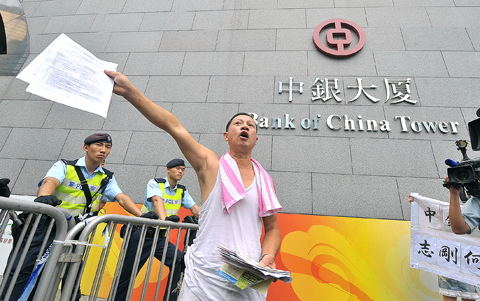Hong Kong’s de facto central bank said yesterday it would trim its benchmark interest rate by 1 percentage point to 2.5 percent to encourage lending amid the global credit crunch.
The move by the Hong Kong Monetary Authority (HKMA), effective today, is a break from the territory’s traditional pattern of closely tracking the US Federal Funds target rate, now at 2 percent, because of the local currency’s peg to the US dollar.
“One has to do extraordinary things at extraordinary moments,” said Jacky Choi (蔡雅頌), a Hong Kong-based fund manager at Value Partners Ltd (惠理基金管理公司), which manages about US$5 billion in Asia.

PHOTO: AFP
Choi described the authority’s decision as reasonable, saying it would help local banks solve their short-term liquidity problems but would not likely bring immediate relief to the plunging stock market.
The authority said in a statement that Hong Kong’s base rate — the reference for lending overnight funds to local banks through its discount window — would be slashed to 2.5 percent from 3.5 percent today.
The cut came after the HKMA revised its formula for calculating its base rate from 150 basis points above the prevailing US fed funds rate to 50 basis points, it said.
The 150 basis points “is larger in Hong Kong than elsewhere, and has become unjustified, particularly in the light of stressful conditions in global financial markets,” said HKMA Chief Executive Joseph Yam (任志剛) in a statement.
On Tuesday, Federal Reserve Chairman Ben Bernanke gave a gloomy assessment of the US economy, appearing to open the door wider to an interest rate cut in the US on or before the central bank’s next meeting on Oct. 28 and Oct. 29.
The Fed’s key interest rate now stands at 2 percent.
The Fed in June had halted an aggressive rate-cutting campaign to revive the economy out of fear those low rates would aggravate inflation.
Since then, financial and economic conditions have deteriorated, while record-high energy prices have calmed, giving the Fed more leeway to again cut rates.
In a speech to the National Association for Business Economics, Bernanke warned the country could be stuck in the economic doldrums for some time.
“The outlook for economic growth has worsened,” Bernanke said. “The heightened financial turmoil that we have experienced of late may well lengthen the period of weak economic performance.”
Wall Street turned its back. The Dow Jones industrials lost 508 points, more than 5 percent, to close at 9,447, the lowest since Sept. 30, 2003.
The Standard & Poor’s 500, a broader stock index, closed below 1,000 for the first time since that same day.

The Central Weather Administration (CWA) yesterday said it expected to issue a sea warning for Typhoon Fung-Wong tomorrow, which it said would possibly make landfall near central Taiwan. As of 2am yesterday, Fung-Wong was about 1,760km southeast of Oluanpi (鵝鑾鼻), Taiwan’s southernmost point, moving west-northwest at 26kph. It is forecast to reach Luzon in the northern Philippines by tomorrow, the CWA said. After entering the South China Sea, Typhoon Fung-Wong is likely to turn northward toward Taiwan, CWA forecaster Chang Chun-yao (張峻堯) said, adding that it would likely make landfall near central Taiwan. The CWA expects to issue a land

The Central Weather Administration (CWA) yesterday said it is expected to issue a sea warning for Typhoon Fung-wong this afternoon and a land warning tomorrow. As of 1pm, the storm was about 1,070km southeast of Oluanpi (鵝鑾鼻), Taiwan’s southernmost point, and was moving west-northwest at 28 to 32kph, according to CWA data. The storm had a radius of 250km, with maximum sustained winds of 173kph and gusts reaching 209kph, the CWA added. The storm is forecast to pass near Luzon in the Philippines before entering the South China Sea and potentially turning northward toward Taiwan, the CWA said. CWA forecaster Chang Chun-yao (張峻堯) said

PREPARATION: Ferry lines and flights were canceled ahead of only the second storm to hit the nation in November, while many areas canceled classes and work Authorities yesterday evacuated more than 3,000 people ahead of approaching Tropical Storm Fung-wong, which is expected to make landfall between Kaohsiung and Pingtung County this evening. Fung-wong was yesterday morning downgraded from a typhoon to a tropical storm as it approached the nation’s southwest coast, the Central Weather Administration (CWA) said, as it issued a land alert for the storm. The alert applies to residents in Tainan, Kaohsiung, Pingtung and Taitung counties, and the Hengchun Peninsula (恆春). As of press time last night, Taichung, Tainan, Kaohsiung, and Yilan, Miaoli, Changhua, Yunlin, Pingtung and Penghu counties, as well as Chiayi city and county had

The Central Weather Administration (CWA) yesterday issued a sea alert for Typhoon Fung-wong (鳳凰) as it threatened vessels operating in waters off the Pratas Islands (Dongsha Islands, 東沙群島), the Bashi Channel and south of the Taiwan Strait. A land alert is expected to be announced some time between late last night and early this morning, the CWA said. As of press time last night, Taoyuan, as well as Yilan, Hualien and Penghu counties had declared today a typhoon day, canceling work and classes. Except for a few select districts in Taipei and New Taipei City, all other areas and city